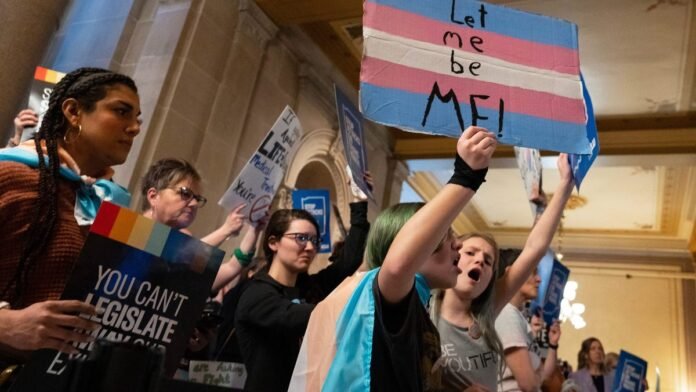The Supreme Court hears oral arguments today on the ability of states to restrict treatments for minors whose gender identity doesn’t align with their sex assigned at birth.
In the latest culture war battle to hit the high court, the justices will debate whether Tennessee can ban puberty blockers and hormone therapy for gender dysphoria – while allowing those treatments for other purposes.
Tennessee, one of about two dozen states that have passed such restrictions in recent years, argues there are too many risks and not enough proven benefits to giving transgender minors the ability to delay puberty and develop physical traits that align with their gender identity.
The Justice Department and the American Civil Liberties Union − which is representing the Tennessee families challenging the ban − say the treatments are considered safe and effective by major medical associations. Denying them to transgender youth, they contend, is discrimination.
Here are the latest updates from the debate:
When the Supreme Court, in 2022, overruled the constitutional right to an abortion, the majority said the issue was better left in the hands of legislative bodies. The court said it had “neither the authority nor the expertise” to decide the relative importance of the fetus versus the mother.
Similar reasoning was used by Judge Jeffrey Sutton in the 6th U.S. Circuit Court of Appeals’ ruling in favor of Tennessee’s law.
Because the treatments are “still experimental,” Sutton wrote, courts should be cautious about imposing a “constitutional straightjacket on legislative choices.”
Sutton also cited Dobbs v. Jackson Women’s Health Organization, the 2022 abortion case, in explaining why Tennessee’s ban is not sex discrimination.
In Dobbs, the court said laws limiting abortion don’t run afoul of the equal protection clause. Tennessee’s law doesn’t either, Sutton wrote, just because it references a person’s sex – as do abortion laws.
– Maureen Groppe
A divided Supreme Court, in 2020, did bar workplace discrimination against gay, lesbian and transgender employees – a surprise victory for the LGBTQ community.
Justice Neil Gorsuch wrote that decision, which was backed by Chief Justice John Roberts and the court’s liberal justices.
But that case turned on the language of a federal civil rights law and not the Constitution’s equal protection clause.
In this case, both sides have laid out arguments for why that 2020 decision is or is not relevant.
– Maureen Groppe
The Justice Department argues transgender Americans have historically been discriminated against.
“And such hostility is rising rather than abating,” the department told the court in a written argument, pointing to a “staggering number of laws” targeting transgender individuals passed by states.
President-elect Donald Trump, who made opposition to transgender rights a central theme of his campaign, has said he wants to “stop the chemical, physical and emotional mutilation of our youth.”
Tennessee, on the other hand, said it “blinks reality” to argue transgender people lack political power. As evidence, the state’s lawyers list a variety of steps the Biden administration took to support transgender people.
“That they have not found success on every issue in every State does not prove powerlessness,” Tennessee’s lawyers told the Supreme Court.
– Maureen Groppe
The main issue the court is deciding is whether the bans discriminate either because of a person’s sex or transgender status.
If they do, the bans might still be allowed. But Tennessee would have a greater burden to show its law advances an important government interest.
Opponents say the laws discriminate. That’s because a teenager whose sex assigned at birth is male may be given testosterone to treat delayed puberty, but a teenager assigned female at birth who wants testosterone to treat gender dysphoria may not have it.
Tennessee says it’s restricting treatments based on what they are being used for and the patient’s age – not because of the patient’s sex or transgender status – so they do not discriminate.
– Maureen Groppe
